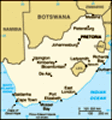Advertisement
Published: November 15th 2012
On leaving St. Lucia, my next destination was Sodwana Bay. Again, this is not an easy place to get to without your own transport and I knew it might be a bit of an effort. Firstly, I had to take the return journey to Mthubathuba. I found a minibus, but they said it would cost me 250 rand, despite the journey a couple of days in the opposite direction costing 17 rand. I resolved to try hitch, but got no joy from the many holidaying white South Africans, who clearly would never dream of picking up a smelly backpacker. Funnily enough, about 20 minutes later, the minibus that had tried to charge 250 rand passed by, this time half full with passengers and this time agreeing to let me on for the correct price.
At Mthubathuba, I tried to find another bus going to Mbwanzana. One thing that has been quite different about the public transport in South Africa, is that you have to actively approach people and ask to find out where each minibus is going. In every other country, you cannot walk for more than a few seconds before being surrounded by conductors telling you where
their bus is going and trying to get you on board.
I eventually managed to find a minibus going to Mbwanzana, but there was only one other passenger on it and after about an hour there was only about 5. They somehow managed to find some other minibus going that direction and we switched on to that one. On this bus, I sat at the front beside Sipo, from Mozambique, who spoke very good English. He asked me about my travels and was overly effusive in his praise, commending my bravery and courage, while saying I should write a book. This nonsense was emphasised, when he told me of his own life story.
As a boy in Mozambique, he was conscripted into the army at the age of 14. He was taken away from his family for months on end for training and they never knew of his whereabouts or of his well-being. He was allowed some relief to visit his family, when his father encouraged him to flee to South Africa, rather than be killed in the civil war. At first, he worked a few menial jobs, but then got work in the
gold mines.
He also began to play football for a local team and became quite popular with his team, who got him out of the gold mines and got him a job as a cook. His football team also helped him to get an education and he completed high school, went to university and qualified as a teacher. After working for 6 years as a teacher, he decided to set up his own school and now runs 2, employing 12 teachers, with no funding from the government.
When he left Mozambique, he had no more contact with his family and knew nothing of where they were or if they were alive. He was particularly worried about his father, as he knew he could face some repercussions for his son having fled. After 20 years, he went back and found them living many miles from Maputo, where they had previously lived and where their house was now destroyed. They were living in very meagre conditions. His sister, who he had managed to get in contact with, had to introduce him to his parents, a shock he said his father never recovered from and who had
since died after he took him and his mother down to South Africa with him. The mother is now 90 and blind, living with him. After he finished telling me his remarkable story, I assured him, that there was only one of us that should be writing a book.
Sipo told me this tale as we sat in the front seat of a minibus, where the driver insisted on going at speeds of 160kmph, but luckily we arrived alive in Mbwanzana. Sipo helped me find the road that was going down to Sodwana Bay, where I hitched a lift half way down, then walked for a bit until I came across the campsite at Natural Moments.
The main reason I had come to Sodwana Bay was to go scuba diving. I was up at 7 a.m. the next morning to join a dive with Sodwana Bay Resort. The beach was very like that at Cape Vidal, but there were lots of people going out diving, snorkelling and spear fishing. There were 10 of us on the speedboat going out and it was a very different experience to my previous dives in Egypt, where I
had dived alone with the instructor.
I did two dives, with the second one being more enjoyable than the first, as the visibility was a lot better. It had been over 6 months since I had dived, so I was a little nervous about whether I would remember everything, but aside from one panicky moment I had, when trying and failing to adjust my mask I was fine. The amount of marine life we saw was incredible and it was like being in the Cape Town Aquarium. Unfortunately, we found out when we got out, there were a couple of humpback whales in the water, which none of us managed to see. Despite these being massive creatures, we must have been some metres below them and missed them. We did see them up close, when we got back in the boat though.
Advertisement
Tot: 0.125s; Tpl: 0.012s; cc: 14; qc: 49; dbt: 0.0751s; 1; m:domysql w:travelblog (10.17.0.13); sld: 1;
; mem: 1.2mb











